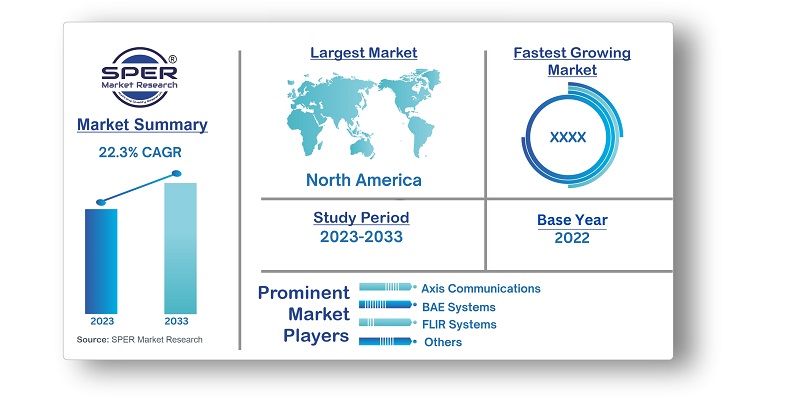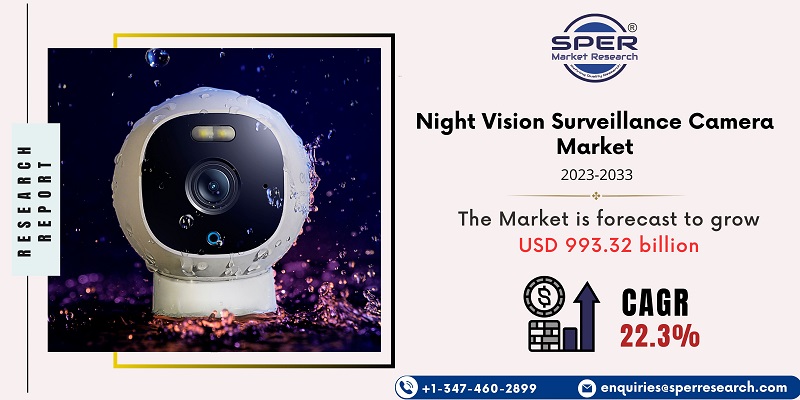
Night Vision Surveillance Camera Market Growth, Size, Trends, Demand, Revenue and Future Share
Night Vision Surveillance Camera Market Size- By Product Type, By Application, By Type- Regional Outlook, Competitive Strategies and Segment Forecast to 2033
| Published: Nov-2023 | Report ID: IACT23176 | Pages: 1 - 224 | Formats*: |
| Category : Information & Communications Technology | |||
- In December 2018, a USD 28.6 million contract was given to Intevac Inc. to design and produce digital night vision cameras for the US Army's IVAS (Integrated Visual Augmentation System) programme.
- In February 2019, Thales Group declared that it would be working with military equipment manufacturer MKU Ltd. in India to co-develop ELFIE night vision systems. ELFIE will offer both night warfare capability and easy mobility. The gadget can be mounted on a helmet or weapon and is suitable for both left and right eyes.


| Report Metric | Details |
| Market size available for years | 2019-2033 |
| Base year considered | 2022 |
| Forecast period | 2023-2033 |
| Segments covered | By Product Type, By End-Use, By Type |
| Regions covered | North America, Asia-Pacific, Latin America, Middle East & Africa and Europe |
| Companies Covered | Axis Communications, BAE Systems, FLIR Systems, Hanwha, Hikvision Digital Technology, L-3 Communications Holdings, NETGEAR, Panasonic, Pelco, Raytheon, Robert Bosch, Samsung Electronics, Schneider Electric, Others |
- Businesses looking to protect their premises
- Homeowners seeking enhanced home security
- Property managers, and organizations focused on monitoring critical infrastructure or high-value assets.
- Security and law enforcement agencies
- Others
| By Product Type: |
|
| By End-Use: |
|
| By Type: |
|
| By Region: |
|
- Global Night Vision Surveillance Camera Market Size (FY’2023-FY’2033)
- Overview of Global Night Vision Surveillance Camera Market
- Segmentation of Global Night Vision Surveillance Camera Market By Product Type (Box Camera, Bullet Camera, Dome Camera)
- Segmentation of Global Night Vision Surveillance Camera Market By End-Use (Business Organization, Industrial, Public Sector and Defense, Retail, Stadium, Transportation, Others)
- Segmentation of Global Night Vision Surveillance Camera Market By Type (Fixed, PTZ)
- Statistical Snap of Global Night Vision Surveillance Camera Market
- Expansion Analysis of Global Night Vision Surveillance Camera Market
- Problems and Obstacles in Global Night Vision Surveillance Camera Market
- Competitive Landscape in the Global Night Vision Surveillance Camera Market
- Impact of COVID-19 and Demonetization on Global Night Vision Surveillance Camera Market
- Details on Current Investment in Global Night Vision Surveillance Camera Market
- Competitive Analysis of Global Night Vision Surveillance Camera Market
- Prominent Players in the Global Night Vision Surveillance Camera Market
- SWOT Analysis of Global Night Vision Surveillance Camera Market
- Global Night Vision Surveillance Camera Market Future Outlook and Projections (FY’2023-FY’2033)
- Recommendations from Analyst
1.1. Scope of the report1.2. Market segment analysis
2.1. Research data source2.1.1. Secondary Data2.1.2. Primary Data2.1.3. SPER’s internal database2.1.4. Premium insight from KOL’s2.2. Market size estimation2.2.1. Top-down and Bottom-up approach2.3. Data triangulation
4.1. Driver, Restraint, Opportunity and Challenges analysis4.1.1. Drivers4.1.2. Restraints4.1.3. Opportunities4.1.4. Challenges4.2. COVID-19 Impacts of the Global Night Vision Surveillance Camera Market
5.1. SWOT Analysis5.1.1. Strengths5.1.2. Weaknesses5.1.3. Opportunities5.1.4. Threats5.2. PESTEL Analysis5.2.1. Political Landscape5.2.2. Economic Landscape5.2.3. Social Landscape5.2.4. Technological Landscape5.2.5. Environmental Landscape5.2.6. Legal Landscape5.3. PORTER’s Five Forces5.3.1. Bargaining power of suppliers5.3.2. Bargaining power of buyers5.3.3. Threat of Substitute5.3.4. Threat of new entrant5.3.5. Competitive rivalry5.4. Heat Map Analysis
6.1. Global Night Vision Surveillance Camera Market Manufacturing Base Distribution, Sales Area, Product Type6.2. Mergers & Acquisitions, Partnerships, Product Launch, and Collaboration in Global Night Vision Surveillance Camera Market
7.1. Global Night Vision Surveillance Camera Market Value Share and Forecast, By Product Type, 2023-20337.2. Box Camera7.3. Bullet Camera7.4. Dome Camera
8.1. Global Night Vision Surveillance Camera Market Value Share and Forecast, By End-Use, 2023-20338.2. Business Organization8.3. Industrial8.4. Public Sector and Defense8.5. Retail8.6. Stadium8.7. Transportation8.8. Others
9.1. Global Night Vision Surveillance Camera Market Value Share and Forecast, By Type, 2023-20339.2. Fixed9.3. PTZ (Pan, Tilt, and Zoom)
10.1. Global Night Vision Surveillance Camera Market Size and Market Share
11.1. Global Night Vision Surveillance Camera Market Size and Market Share By Product Type (2019-2026)11.2. Global Night Vision Surveillance Camera Market Size and Market Share By Product Type (2027-2033)
12.1. Global Night Vision Surveillance Camera Market Size and Market Share By End-Use (2019-2026)12.2. Global Night Vision Surveillance Camera Market Size and Market Share By End-Use (2027-2033)
13.1. Global Night Vision Surveillance Camera Market Size and Market Share By Type (2019-2026)13.2. Global Night Vision Surveillance Camera Market Size and Market Share By Type (2027-2033)
14.1. Global Night Vision Surveillance Camera Market Size and Market Share By Region (2019-2026)14.2. Global Night Vision Surveillance Camera Market Size and Market Share By Region (2027-2033)14.3. Asia-Pacific14.3.1. Australia14.3.2. China14.3.3. India14.3.4. Japan14.3.5. South Korea14.3.6. Rest of Asia-Pacific14.4. Europe14.4.1. France14.4.2. Germany14.4.3. Italy14.4.4. Spain14.4.5. United Kingdom14.4.6. Rest of Europe14.5. Middle East and Africa14.5.1. Kingdom of Saudi Arabia14.5.2. United Arab Emirates14.5.3. Rest of Middle East & Africa14.6. North America14.6.1. Canada14.6.2. Mexico14.6.3. United States14.7. Latin America14.7.1. Argentina14.7.2. Brazil14.7.3. Rest of Latin America
15.1. Axis Communications15.1.1. Company details15.1.2. Financial outlook15.1.3. Product summary15.1.4. Recent developments15.2. BAE Systems15.2.1. Company details15.2.2. Financial outlook15.2.3. Product summary15.2.4. Recent developments15.3. FLIR Systems15.3.1. Company details15.3.2. Financial outlook15.3.3. Product summary15.3.4. Recent developments15.4. Hanwha15.4.1. Company details15.4.2. Financial outlook15.4.3. Product summary15.4.4. Recent developments15.5. Hikvision Digital Technology15.5.1. Company details15.5.2. Financial outlook15.5.3. Product summary15.5.4. Recent developments15.6. L-3 Communications Holdings15.6.1. Company details15.6.2. Financial outlook15.6.3. Product summary15.6.4. Recent developments15.7. NETGEAR15.7.1. Company details15.7.2. Financial outlook15.7.3. Product summary15.7.4. Recent developments15.8. Panasonic15.8.1. Company details15.8.2. Financial outlook15.8.3. Product summary15.8.4. Recent developments15.9. Pelco15.9.1. Company details15.9.2. Financial outlook15.9.3. Product summary15.9.4. Recent developments15.10. Raytheon15.10.1. Company details15.10.2. Financial outlook15.10.3. Product summary15.10.4. Recent developments15.11. Robert Bosch15.11.1. Company details15.11.2. Financial outlook15.11.3. Product summary15.11.4. Recent developments15.12. Samsung Electronics15.12.1. Company details15.12.2. Financial outlook15.12.3. Product summary15.12.4. Recent developments15.13. Schneider Electric15.13.1. Company details15.13.2. Financial outlook15.13.3. Product summary15.13.4. Recent developments15.14. Others
SPER Market Research’s methodology uses great emphasis on primary research to ensure that the market intelligence insights are up to date, reliable and accurate. Primary interviews are done with players involved in each phase of a supply chain to analyze the market forecasting. The secondary research method is used to help you fully understand how the future markets and the spending patterns look likes.
The report is based on in-depth qualitative and quantitative analysis of the Product Market. The quantitative analysis involves the application of various projection and sampling techniques. The qualitative analysis involves primary interviews, surveys, and vendor briefings. The data gathered as a result of these processes are validated through experts opinion. Our research methodology entails an ideal mixture of primary and secondary initiatives.



Frequently Asked Questions About This Report
PLACE AN ORDER
Year End Discount
Sample Report
Pre-Purchase Inquiry
NEED CUSTOMIZATION?
Request CustomizationCALL OR EMAIL US
100% Secure Payment






Related Reports
Our Global Clients
Our data-driven insights have influenced the strategy of 200+ reputed companies across the globe.






















